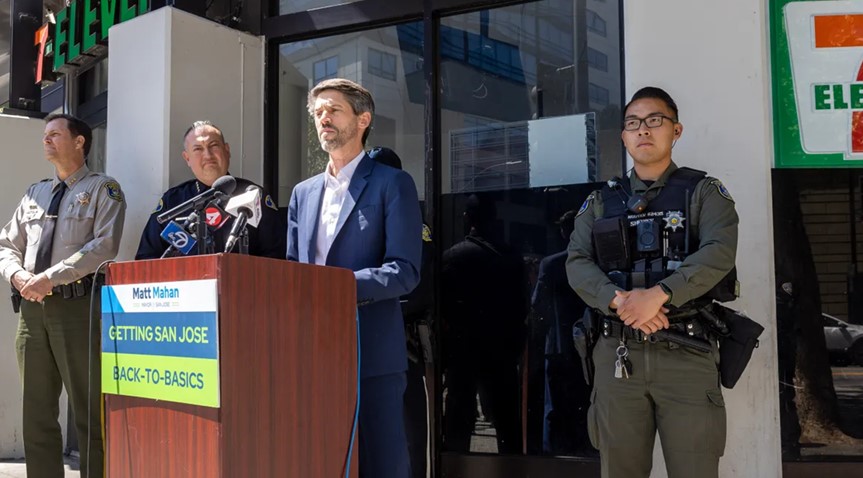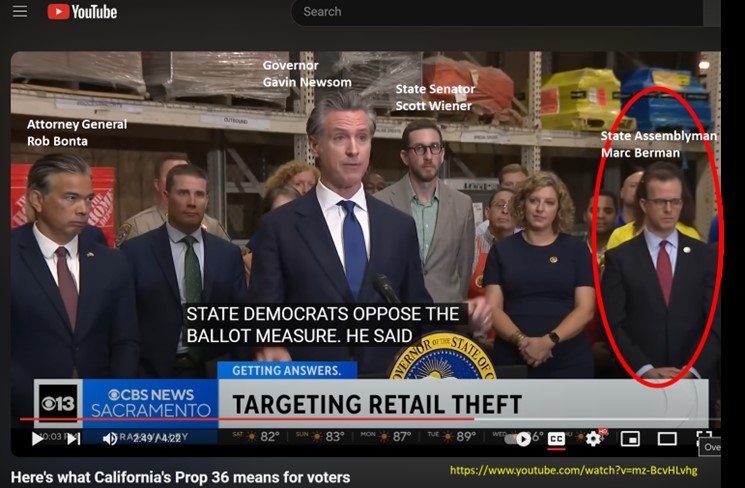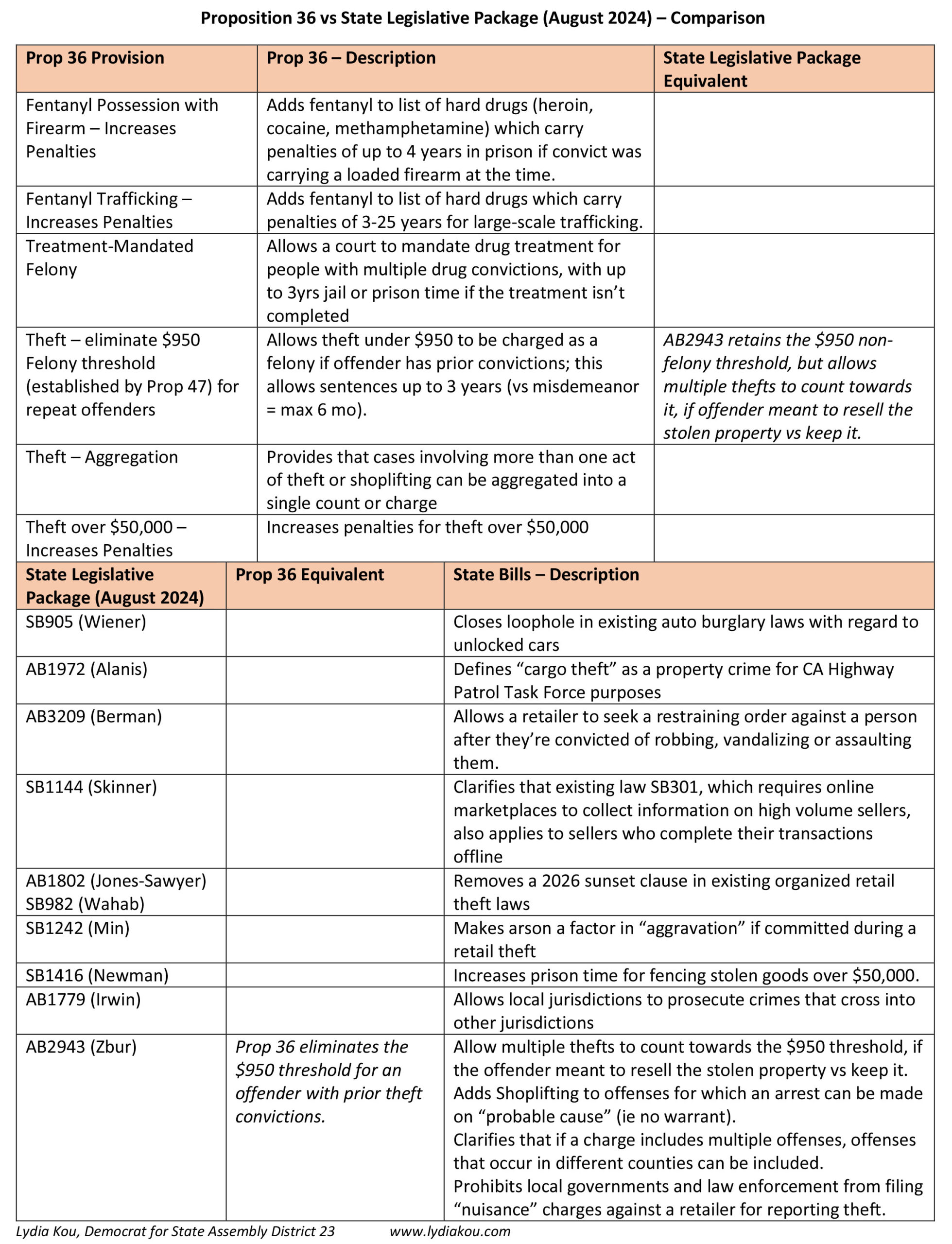After eight years as a Palo Alto councilmember and Mayor, I’ve seen how State officials too often drift apart from their communities and focus on big donors, special interests and ideological pressure groups. They end up doing very little, while telling voters it’s a lot. The contest over this year’s Proposition 36, the “Homelessness, Drug Addiction and Theft Reduction Act,” a crime bill, is a good example of this.
Proposition 36 supporters include law-enforcement agencies, retail businesses, and city mayors including San Jose’s Matt Mahan, SF’s London Breed, Milpitas’ Carmen Montano, and San Diego’s Todd Gloria. Its opponents are led by Governor Newsom and several of the State Legislature leadership. As of mid-August, Prop 36 was polling 56% in favor, 23% against, and 21% undecided. 1
Prop 36 also divides our Assembly District 23: I myself support Prop 36 and recommend a “Yes” vote, and if elected I’ll support related measures where sensible; My opponent, Marc Berman, has been a leading opponent of Prop 36.
Prop 36 Supporters: City Mayors, Sheriffs, Retail businesses
“We are not going to allow repeat theft” – San Jose Mayor Matt Mahan2
Prop 36 Opponents: Sacramento Legislature Leadership
“Nothing to do with retail theft” … “just a couple mayors” – Governor Gavin Newsom3,4
What Does Prop 36 Do?
Proposition 36 corrects unintended consequences of 2014’s Prop 47, called the “Safe Neighborhoods and Schools Act” by its supporters.
Read the OpEd I’ve written about “Reforming Proposition 47”.
Prop 47 attempted to reduce jail populations by reducing penalties for property theft and drug offenses; most infamously, declaring theft under $950 to be only a misdemeanor. While prison populations indeed fell after 2014, property crime also increased, both organized and individual, and law enforcement agencies began warning that toothless enforcement meant some crimes could no longer be justifiably pursued, and that a terrible message was being sent: that society would turn a blind eye to theft under $950. As San Jose Mayor Matt Mahan observed, “being treated as a misdemeanor and a paper citation doesn’t mean a whole lot to some of these people.”
Prop 36 reverses controversial provisions of Prop 47.
- It eliminates the $950 threshold,
- restores courts’ ability to charge repeat theft offenders with felonies, and
- expands judges’ ability to order mandatory drug treatment.
Why Do the Governor and Current State Legislators Oppose Prop 36?
The State Legislature strongly supported Prop 47 in 2014 for two main reasons: first, in order to reduce prison populations; and second, because it aligned with two cherished progressive ideologies which continue to carry outsized influence in Sacramento:
- that crime is really a societal problem, and thus criminals aren’t entirely responsible for their actions, so penalties aren’t a deterrent; and
- that drug use is not only a victimless crime but is actually a civil right, so shouldn’t be punished at all (or treatment-mandated either).
Therefore, despite rising public concern about property crime after 2014, Sacramento basically did nothing; hence reforms to Prop 47 emerged as a voter initiative instead — this year’s Prop 36. However, once it became clear that Prop 36 had enough public momentum to reach the ballot, the State Assembly and Senate did indeed act: they tried to derail Prop 36.
How Did the State Legislature Try to Derail Prop 36?
The first Legislature attempt was to develop a competing but weaker ballot measure that would do part of what Prop 36 does, but not all; and assume voters would be confused between the two measures. However, the competing State measure was not ready by this year’s election-filing deadline, and so is not on the 2024 ballot.
After the competing measure was dropped, the State Legislature instead rushed through a new package of 10 “anti-crime” bills of its own, which Governor Newsom duly signed into law in August. A controversial “Poison Pill” provision on these bills, though ultimately not included, would have declared the Legislature’s package of bills to be canceled if Prop 36 passed – basically a threat to voters not to support Prop 36.
Governor Newsom and the Legislature leadership still oppose Prop 36, arguing that with the State’s 10-bill package now law, Prop 36 is no longer needed. WRONG!
Why Do City Mayors Still Support Prop 36 if the Legislature Already Passed 10 Bills?
Because City Mayors actually have to deal with crime and addiction-related homelessness.
What’s the Difference Between Prop 36 and the State Legislature’s 10-bill Package?
Other than the State bills being reversable by future bills, the two biggest differences between Prop 36 and the State package are that:
- Prop 36 restores courts’ discretion to charge repeat offenders with felonies for thefts under $950. The State legislation package doesn’t support this.
- Prop 36 expands judges’ ability to mandate and enforce drug treatment for offenders with prior convictions.
These are tools many law-enforcement agencies and city mayors say they need to combat repeat crime by addicts who refuse treatment. The State’s 10 bills don’t address this area.
The State Legislature package is basically a smorgasbord of smaller bills and incremental tweaks to existing laws. For example,
-
AB3209 (Berman) makes it easier for you to get a restraining order against a robber — but only after they’ve already robbed you.
-
SB905 (Wiener) closes an odd loophole that reduces the severity of car break-ins if your car wasn’t locked.
-
AB1972 explicitly specifies “cargo theft” as a property crime.
And so on. By themselves the State bills aren’t bad things per se — a car break-in is a car break-in, whether or not you locked your vehicle. Having a restraining order isn’t a negative, though whether someone who’s willing to break into your home would actually be deterred by one is unclear.
But the State bills don’t address the more basic issue that Milpitas Mayor Montano described: how her city police officers “can’t pursue [smash-and-grab] crime because their hands are tied, because most of the thefts would be considered petty theft.” Instead, most people would look at the State package and read it as the Legislature doing something small, and telling voters it was big.
A full comparison list is shown below. You can download the PDF here.
The key differences between Prop 36 and the State bills really boil down to Deterrence and Mandatory Treatment, and the questions of (1) whether or not you believe punishment and the message it sends are a deterrent to crime; and (2) where the balance lies between the rights of criminals vs the rights of people at large.
Summary – YES on 36, NO on Sacramento Performance
Based on the above, I believe the benefits of Prop 36 are significant and its drawbacks are relatively few; I plan to vote YES on it, and I hope you’ll consider that as well. It’s hard to think of anything more fundamental for society than Public Safety.
Sacramento continues to grade itself on the sheer number of bills it passes, when instead it should focus on what those bills actually achieve, or don’t. Irrespective of where any of us stands on Prop 36, I find the State Legislature’s work on this entire matter to be of poor quality, misleading, and frankly heavy-handed towards voters almost to the point of contempt. That’s not how I feel about you, and as your Assemblywoman it’s not how I’ll do the job.
Lydia Kou
References
1. Los Angeles Times https://www.latimes.com/california/story/2024-08-16/poll-california-ballot-measures-prop-32-prop-33-prop-36
2. The Mercury News https://www.mercurynews.com/2024/08/14/san-jose-mayor-forms-committee-supporting-passage-of-prop-36/
3. ABC News Sacramento https://www.youtube.com/watch?v=mz-BcvHLvhg
4. San Jose Spotlight https://sanjosespotlight.com/san-jose-leaders-push-proposition-36-as-critics-fight-back/






Recent Comments